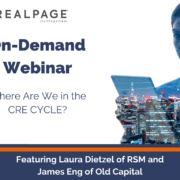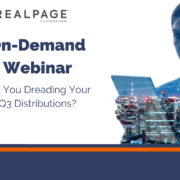Managing Private Investments and Overcoming Common Hurdles
We partnered with VENTURE.co to present a webinar on managing private investments. Ron Rossi, VP of Customer Success at RealPage IMS, joined the discussion as an expert panelist. Other panelists included Steve Katcher, Senior VP of Chalice Wealth Partners; Aaron Pollak, CEO and Founder of VENTURE.co; and Trevor Nesbit, Managing Director of VENTURE.co.
Continue reading for key takeaways from the discussion about managing private investments.
Asset Class Overview
Ron kicked the webinar off by reviewing private investment asset classes. He explained that post-downturn, multifamily continues to be a popular asset class from both an acquisitions and development standpoint, with investors showing a healthy appetite for these types of properties. Within this asset class, student housing is providing risk-adjusted returns, and self-storage utilization appears to increase with multifamily housing. Changing retirement lifestyles are also causing growth in this sector. “We’re increasingly seeing senior housing communities that are targeted to a more active lifestyle and that are being developed even in high-rises today.”
Aaron Pollak then classified alternative assets into three categories: energy, real estate, and corporate. Aaron explained, “The general focus for all of these is to have the ability to disassociate yourself from the market volatility and the trading that goes along with the fixed income and the equity space.”
The CRE Cycle
Market phase continues to be a hot topic. According to Ron, “2017 and early into 2018 were really the peak of this particular market, and there are a few headwinds that real estate operators are trying to work through right now.” He identified several of these challenges and discussed their implications for the industry:
Labor Shortage
Ron explained, “If you have properties that you’re operating, just putting the employees in place can be difficult because the labor markets have been so tight.” A tight labor market is an indicator of a strong economy, but it can drive up operating cost significantly.
Construction Costs
“The cost to renovate a building or deliver a building out of the ground continues to increase, and in some markets we are hearing that construction costs have doubled in the last couple of years.” According to Ron, this surge in pricing makes it difficult to make the numbers work sometimes, leading to lower-than-projected ROI.
New Entrants
New and aggressive entrants into the CRE market have driven up prices with their zealous approach. “The bid ask spread has gotten very tight. This notion of a ‘best and final’ when you’re bidding on a deal has now become ‘best and final’ version one, two, and three.” Acquiring properties has become more of a challenge as competition continues to grow.
Protecting Against Volatility
In response to cycle phase and increased cost and competition, private equity deals have gained popularity. Steve Katcher stressed the importance of diversifying portfolios, saying, “Individual investors should be taking advantage of alternative asset classes.” He went on to explain that private equity alternatives are much less volatile than retail investments and individual investor portfolios should ideally include assets from both.
Investor Communication
In keeping with the premise of trust and transparency, Ron expanded upon how IMS helps sponsors to build meaningful investor relationships through data access and communication. He spoke about how investor statements appeal to Millennial investors, who have come to expect real-time access to information.
With the increased demand from investors for trust and transparency, a well-built CRE tech stack is now essential, with many solutions transitioning from luxuries to necessities for the modern commercial real estate sponsor. Investors want to be in the know at all times, with access to the details of their portfolio and how their investments are doing. These insights provide your investors with a sense of control over their investments, creating comfort and confidence amid the risk and potential volatility inherent to investing. Adding an investor management software to your investor strategy will help you to improve investor transparency while saving valuable time and driving back office efficiencies.
To learn more about building a winning CRE tech stack, register for our upcoming webinar CRE Tech Best Practices: Unlocking Back-Office Efficiencies











